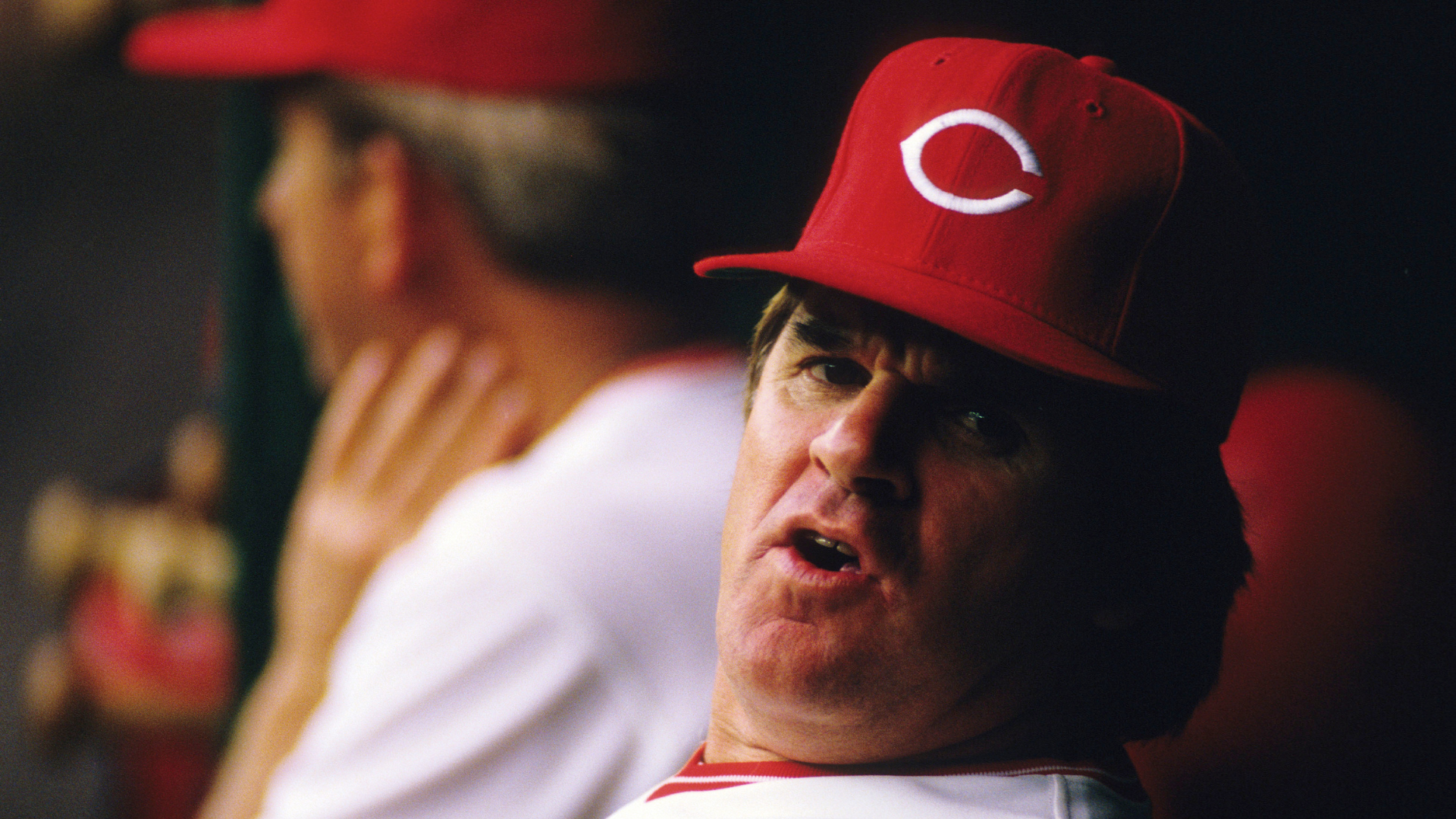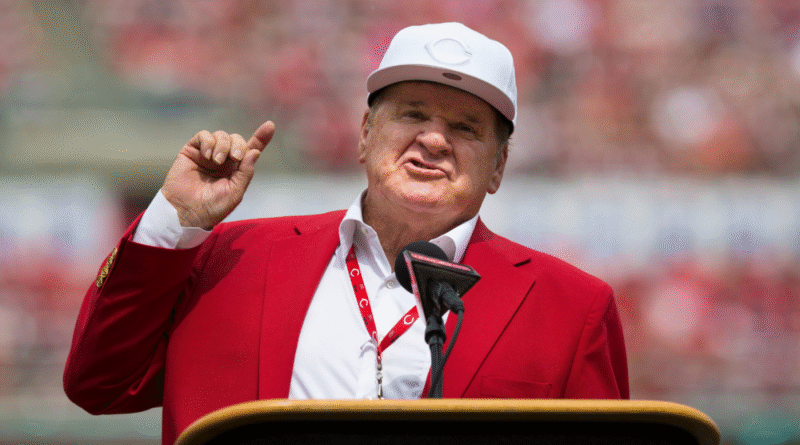Ranking the Hall of Fame cases of Pete Rose, ‘Shoeless’ Joe Jackson and more newly reinstated MLB players
Major League Baseball commissioner Rob Manfred announced Tuesday that he has reinstated 17 dead players from the permanently ineligible list. Given that the players are not alive to celebrate the news, there’s really only one reason for reinstatement: consideration for the Baseball Hall of Fame.
The Hall of Fame has already announced that any of the now-reinstated players would be considered by the Historical Overview Committee to possibly be placed on the Classic Baseball Era Committee ballot for December 2027. Any of these players hitting that ballot will be judged by a 16-person panel, made up of Hall of Fame members, former team executives and veteran media members/historians, and would need to get a “yes” vote from at least 12 of the 16 voters.
Pete Rose, ‘Shoeless’ Joe Jackson reinstated from MLB’s permanently ineligible list: Next stop, Hall of Fame?
Dayn Perry

The big name on Manfred’s list is obviously Pete Rose, but “Shoeless” Joe Jackson shouldn’t be ignored. In addition to Rose and Jackson, Eddie Cicotte, Happy Felsch, Chick Gandil, Fred McMullin, Swede Risberg, Buck Weaver, Lefty Williams, Joe Gedeon, Gene Paulette, Benny Kauff, Lee Magee, Phil Douglas, Cozy Dolan, Jimmy O’Connell, and William Cox were also reinstated.
Do any of these players have a chance at making the Hall of Fame? We’re here to sort that out.
Let’s try to keep in mind we are merely taking a look at the Hall of Fame candidacies and discussing things that might come to the minds of people during such discussion. Remember that there are disagreements among many fans as to how big of a crime throwing a World Series is compared to betting only on one’s own team to win (which was long Rose’s claim, though it hasn’t been 100% corroborated with evidence).
No chance
Note: Most of these players were connected to the 1919 Black Sox Scandal, where they were found to have lost the World Series on purpose (or “threw” it).
- Buck Weaver has become famous for John Cusack’s portrayal of him in “Eight Men Out” — a movie about the Black Sox Scandal — specifically how the movie focused on how Weaver played well in that 1919 World Series the White Sox. He did hit .324 with four doubles and a triple in the eight games. He also hit well (.333 average) in the White Sox’s 1917 World Series title. Still, he was banned after nine MLB seasons, hitting .272/.307/.355 with just 1,308 hits and 21.2 WAR. It’s hard to see a case here.
- Happy Felsch only played in parts of six seasons. He was a very good player, hitting .293/.347/.427 (123 OPS+) with 19.4 WAR, but there just wasn’t enough here for serious consideration, especially considering the stain of the Black Sox Scandal.
- Coincidentally, Chick Gandil also finished with exactly 19.4 WAR, but his came in nine seasons. He hit .277/.327/.362 (103 OPS+) as a first baseman. A fine career until the gambling stain, but he wasn’t a HOF type anyway.
- Phil Douglas was banned for indicating that he wanted to leave the Giants but needed some “inducement” in order to do so. He finished his career 94-93 with a 2.80 ERA (111 ERA+), winning the ERA title in his final season at age 32.
- Lefty Williams topped 20 wins in each of his final two seasons before the ban. Still, he finished 82-48 in parts of seven seasons with a 3.13 ERA (99 ERA+) and 12.9 WAR. He even led the majors in both earned runs and home runs allowed in his last season.
- Lee Magee was found to have fixed a game in 1919 while playing for the Cubs. The ban ended his nine-year career, in which he hit .276/.325/.350 with 1,031 career hits and 10.2 WAR.
- Fred McMullin only played in parts of six years and ended with 2.8 WAR while hitting .256 with an 85 OPS+.
- Swede Risberg wrapped his career with 3.2 WAR in four seasons, hitting .243 with an 83 OPS+.
- Joe Gedeon wasn’t on the White Sox, but was found to have been in some meetings regarding throwing the World Series. In his seven MLB seasons, he hit .244 with a 75 OPS+ and 1.2 WAR.
- Gene Paulette was found to have accepted gifts from gamblers and accused of offering to throw some games. In his six years, he hit .269 with a 92 OPS+ and 2.1 WAR.
- Jimmy O’Connell is alleged to have offered money to a Phillies player to throw a game with pennant implications. He was only 23 years old and finished with just 139 games played in the majors.
- Cozy Dolan was done playing and was actually a coach when he was banned along with O’Connell. Despite the amazing nickname of Cozy, O’Connell hit just .252 with 2.5 WAR in his seven years as a player.
- William Cox was a Phillies owner who was found to have gambled on baseball in 1943.
Not out of the question
Eddie Cicotte, a workhorse right-hander, logged 14 years in the majors before his ban from baseball. He finished with 209 career wins against 148 losses, leading the league in victories twice and topping 20 in a season three times. His career ERA was 2.38 (123 ERA+). He won an ERA title in the same year he led the majors in innings (1917, when he amassed 11.9 WAR to lead the majors). He ended up with 3,226 career regular-season innings and was the ace of the World Series champs in 1917.
There won’t be a groundswell of movement for Cicotte to make the Hall of Fame, but if we ignored the Black Sox scandal and just looked at his pitching resume, it could be justified. He’s 70th all-time among pitchers in WAR and there are 67 Hall of Fame starting pitchers. He’s ahead of Joe McGinnity, Rube Waddell, Eppa Rixey, Burleigh Grimes and Mordecai “Three Finger” Brown, who all came from a similar era and are currently in the Hall.
As for Benny Kauff, he and his brother were implicated in a car theft and though they were acquitted of the charges, Commissioner Judge Landis banished Kauff anyway, deeming him to not be of proper character in order to restore the integrity of baseball in the wake of the Black Sox Scandal.
Kauff was called the “Ty Cobb of the Feds” regarding his prowess in the Federal League, where he starred for the Indianapolis Hoosiers and Brooklyn Tip-Tops. He appeared in only eight seasons between MLB and the Federal League, but he racked up 29 WAR while slashing .311/.389/.450 (149 OPS+). He could be a special case, especially if more research is done on his background and he’s deemed to have gotten an unjust sentence from Landis.
Still, odds are there are just two players on this list of reinstated who have a chance to ever make the Hall of Fame and we all know who they are.
MLB was wrong to reinstate Pete Rose: Why nothing has changed about hits leader’s baseball gambling
Matt Snyder

It’s plausible
In parts of 13 seasons, Joe Jackson hit .356(!) with a .423 on-base percentage and .517 slugging percentage, clearing the way for a career 170 OPS+. Among players with at least 3,000 plate appearances, Jackson ranks 13th in OPS+. The only players above him not currently in the Hall of Fame are either active (Aaron Judge and Mike Trout) or have a PED tie (Barry Bonds). If you wanted to compare to an all-time great who played in the same era, Ty Cobb had a 168 OPS+.
There are, of course, complications here. Given that Jackson was banned from baseball after his age-32 season, he didn’t play through his decline phase like Cobb did. Generally, that pulls down the rate stats a bit. It also means Jackson didn’t have time to compile heavy counting stats. He finished with 1,772 hits, 307 doubles, 168 triples, 54 home runs, 792 RBI, 873 runs and 202 stolen bases.
The JAWS system has Jackson 14th all-time among right fielders, just barely above the average current Hall of Famer. He’s ahead of Tony Gwynn, Ichiro Suzuki, Dave Winfield and Vladimir Guerrero, to name a few.
Still, those counting numbers likely fall shy of a Hall of Famer for many people. Others might argue him as a “peak” candidate, as he was one of the greatest players in baseball through his prime. His prime wasn’t cut short by injury or death, though, it was because he was banned due to allegedly throwing a World Series.
The favorite
If there is only one person from this list of reinstated late players to make the Hall of Fame, it’s obviously Pete Rose. He was the impetus for this decision, has the best on-field case for the Hall and committed a relatively lesser sin than the others here in terms of the gambling. This isn’t to take a side, per se, but it’s pretty clear that throwing a World Series is a graver baseball sin than gambling on games, if one were to rank such things instead of just labeling them all as unforgivable.
No, Rose isn’t the “greatest hitter ever” as some of his fans love to claim, but he compiled more hits than anyone else in MLB history with 4,256. He also doubled 746 times, good for second all-time. His 2,165 runs scored rank him sixth in history and though he wasn’t a power hitter, he still sits ninth all-time in total bases. He won an MVP, a Rookie of the Year, three batting titles, two Gold Gloves, a Silver Slugger, three World Series, a World Series MVP and was a 17-time All-Star. He finished his career as a .303 hitter with a 118 OPS+.
Rose played left field more than any of his other positions and his 79.6 career WAR ranks fifth all-time among left fielders, trailing Barry Bonds (162.8), Ted Williams (121.8), Rickey Henderson (111.2) and Carl Yastrzemski (96.5).
It’s pretty simple here: Either you think Rose should be a Hall of Famer or believe his off-field exploits should keep him out. On the field, there was no doubt whatsoever.

